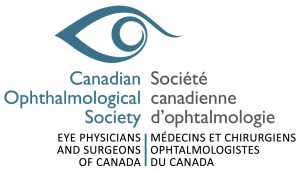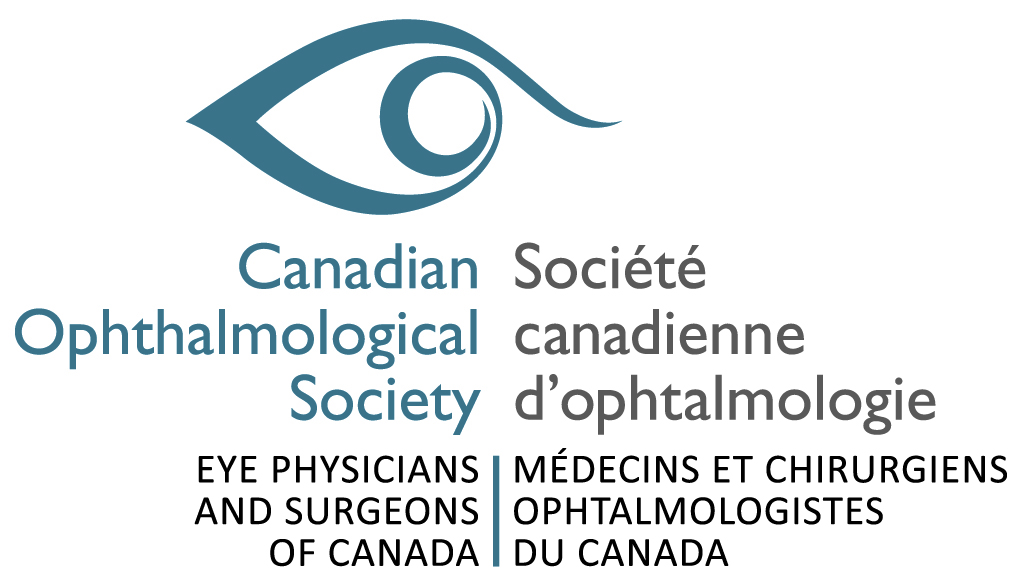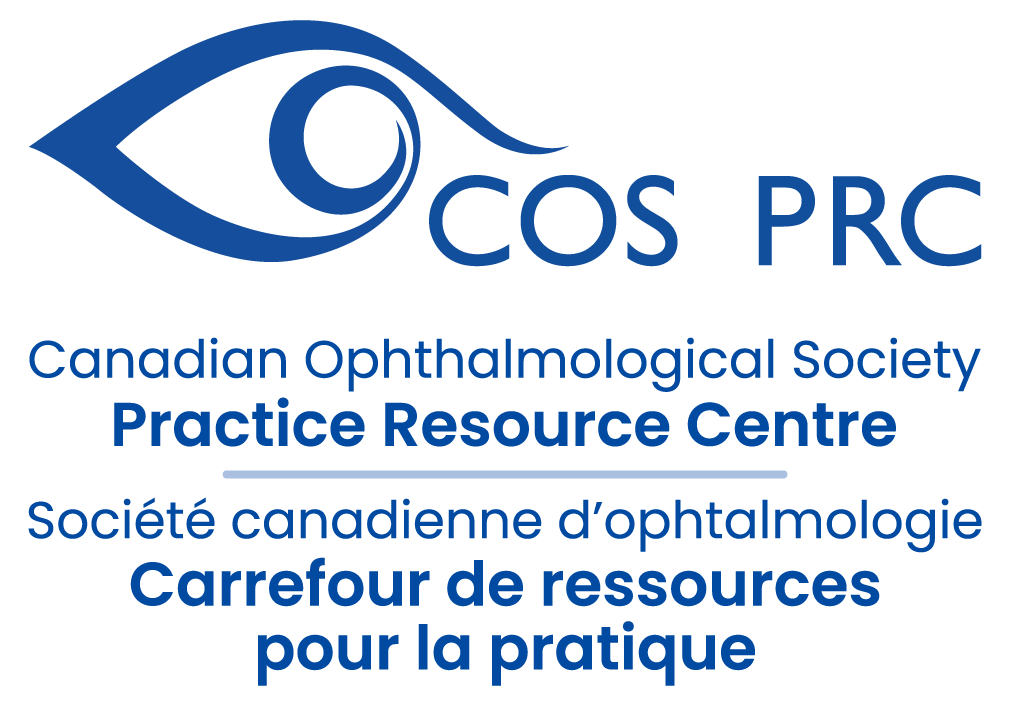Canadian Ophthalmological Society (COS) Joint Position Statement on Biosimilar Drugs
October 2022
Canadian Ophthalmological Society (COS) Joint Position Statement on Biosimilar Drugs



Biosimilar biologic drugs (biosimilars*) were introduced in the Canadian market in 2009. The first ophthalmic biosimilar for intravitreal injection is expected to be launched in Canada in the late fall of 2022. With this launch, it is expected that use of biosimilars across Canada will rapidly increase.
Read the full position statement here
Non-hospital Surgical Centres Advocacy Principles
The Non-Hospital Surgical Centres (NHSC) Principles is a distilled set of advocacy principles developed by the Canadian Ophthalmological Society. This document is based on feedback from a COS Workshop on NHSC held in September 2021, and from member and stakeholder surveys undertaken during the spring of 2022.
To view the full document please click here:

Position Statement by the Canadian Ophthalmological Society (COS) Regarding Vision therapy (VT), or Behavioural Optometry
August 2022

Vision therapy (VT), or behavioural optometry, is a generalized term for behavioural treatments based upon the belief that abnormalities in vision are the underlying cause of learning, neurological and spatial disabilities.
A review of the available literature on these treatments conducted in 2022 by a committee of physicians specializing in pediatric ophthalmology and neuro-ophthalmology found that, with the exception of convergence insufficiency, evidence that these therapies are effective is lacking.
Background
Vision therapy is a term used to refer to a spectrum of in-office supervised exercises that aim to improve visual ability and skill. Vision therapy programs are prescribed for a wide and etiologically diverse group of pathological and non-pathological learning, oculomotor, visual and post-traumatic states. These conditions include strabismus, amblyopia, learning/reading disabilities (dyslexia), myopia, and brain injuries such as stroke, concussion, and trauma with visuospatial neglect. Vision therapy remains an uninsured paramedical service.
Canadian Ophthalmological Society (COS) members have noted a sharp increase in the number of requests to provide an opinion on the effectiveness and validity of prescribed vision therapy programs. These programs can last from several weeks to years and, at times, a lifetime of treatment. The COS Vision Therapy committee feels that additional high-quality evidence-based research must be performed prior to any consideration for public or private insurance coverage.
Read the full position statement here.
Canadian Ophthalmological Society (COS) Joint position paper calling for a complete ban on scleral tattooing and eyeball jewellery implantation in Manitoba
September 2018




Context: There is a growing trend among body modification enthusiasts to tattoo their eyeballs (specifically the sclera of the eye) and also implant jewellery under the surface layer (conjunctiva) of the eyeball. This is being done unsafely by untrained artists under questionable conditions and leading to a
variety of unfortunate complications, including loss of vision and loss of the eye in some cases. As eye health care professionals, the Manitoba Association of Optometrists (MAO) and the Eye Physicians and Surgeons of Manitoba (EPSOM) are submitting this joint statement calling for a ban of these dangerous practices leading to unnecessary morbidity and loss of vision in members of the unsuspecting public.
Read the Full Position Statement Here
Evidence-based clinical practice guidelines for the periodic eye examination in children aged 0-5 years in Canada
December 2019
Evidence-based clinical practice guidelines for the periodic eye examination in children aged 0-5 years in Canada


The Position Stated is based on current evidence and expert medical opinion available at the
time and was endorsed by the COS in November 2019.
Background: As eye disease before age 5 years is common, some form of vision screening should be performed on children before attending primary school. However, the lack of consistent national recommendations creates confusion for patients, eye care professionals, and governments alike.
Download the full guidelines here
Canadian Glaucoma Society Evidence-Based Recommendations for the Risk of Acute Angle Closure Glaucoma with Routine Use of Hyoscine-n-Butylbromide (Buscopan) for Gastroenterological Procedures
November 2019
Evidence-Based Recommendations for the Risk of Acute Angle Closure Glaucoma with Routine Use of Hyoscine-n-Butylbromide (Buscopan) for Gastroenterological Procedures.


The Position Stated is based on current evidence and expert medical opinion available at the time and was endorsed by the COS in November 2019.
Background: Hyoscine-n-butylbromide (Buscopan) is a commonly used anticholinergic medication for
gastroenterological endoscopic procedures because of its ability to induce smooth muscle relaxation and decrease spasm. It can also be used for radiologic procedures of the gastrointestinal tract. Buscopan may increase detection of colorectal adenoma by up to 30%, thus this medication should not be withheld needlessly.
Read the full position statement here.
Advisory Statement: Regarding Light Therapy (Photobiomodulation) for Macular Degeneration
July 21, 2022
Advisory Statement: Regarding Light Therapy (Photobiomodulation) for Macular Degeneration

Discussion: Patients with early dry macular degeneration often have relatively normal vision. As the disease progresses to advanced stages, patients can have both a gradual and/or sudden loss of central vision. There are no proven pharmacologic treatments for dry ARMD, however age-related eye disease study (AREDS) vitamin supplementation has been shown in large, randomized trials to decrease the risk of progressing to advanced macular degeneration. Canadian patients have coverage and access to effective, large randomized clinical trial-proven pharmacologic treatments for wet macular degeneration.
Read the full advisory statement here
Position statement by the Canadian Ophthalmological Society (COS) Regarding Diversity and Inclusion
April 2, 2019
Position Statement by the Canadian Ophthalmological Society (COS) Regarding Diversity and Inclusion

The Canadian Ophthalmological Society (COS) encourages inclusivity and opposes discrimination based on (but not limited to) religion, race, citizenship, country or ethnic origin, language, age, political affiliation or opinion, sex, sexual orientation, gender identity and expression, cognitive or physical ability, and economic status. As the recognized unified voice for ophthalmology in Canada, COS is strengthened by its diversity. COS members come from broad and diverse backgrounds, and this variety of experiences, training, and personal qualities is fundamental to ophthalmologists’ ability to provide the highest quality and culturally competent care for all patients.
Canadian Ophthalmological Society (COS) Position Statement on Biosimilars
July 19th, 2022
Canadian Ophthalmological Society (COS) Position Statement on Biosimilars

Biosimilar biologic drugs (or biosimilars*) were introduced in the Canadian market in 2009, however, the first ophthalmic biosimilar is expected to be launched in Canada in the fall of 2022. With the advent of biosimilar drugs into the Canadian market payors (government and insurers) are developing policies on how these medications are integrated into reimbursement programs for existing “innovator” or reference drugs. The trend currently seems to be toward limiting or restricting physician and patient choice in incorporating biosimilars into the Canadian market.
This seems contrary to the European experience where forced substitution has not been necessary to encourage uptake and realize significant savings.
The physician-patient relationship and a patient’s resulting confidence in their treatment plan is crucial to successful treatment. Limiting choice and mandating changes to existing successful treatment regimens undermines that confidence and could be detrimental to patient care.
In addition, given the unique immunological environment and limited tolerance for inflammation which exists with direct administration of the medication into the eye, the COS cautions against mandating large scale, automatic shifts from the reference to biosimilar medications until sufficient human experience has been accumulated to ensure confidence in safety. Furthermore, as individual patient response to medication varies, physicians must have the opportunity to switch back to the original medication if problems develop in order to prevent harm.
The COS welcomes and supports the potential of biosimilars to expand the choices available for effective treatment of eye disease in a cost-effective manner, however it is vital that payors and payor’s policies do not constrain medical choice or undermine patient confidence in treatment plans.
Created June 2022
*A biosimilar biologic drug, or biosimilar, is a biologic drug that is highly similar to a qualifying biologic drug that was already authorized for sale (known as the reference biologic drug). (Health Canada, Handbook for healthcare professionals on biosimilar biologic drugs, https://www.canada.ca/en/health- canada/services/drugs-health-products/biologics-radiopharmaceuticals-genetic-therapies/biosimilar- biologic-drugs/handbook-healthcare-professionals.html#Biosimilar_Drugs accessed June 27, 2022)



